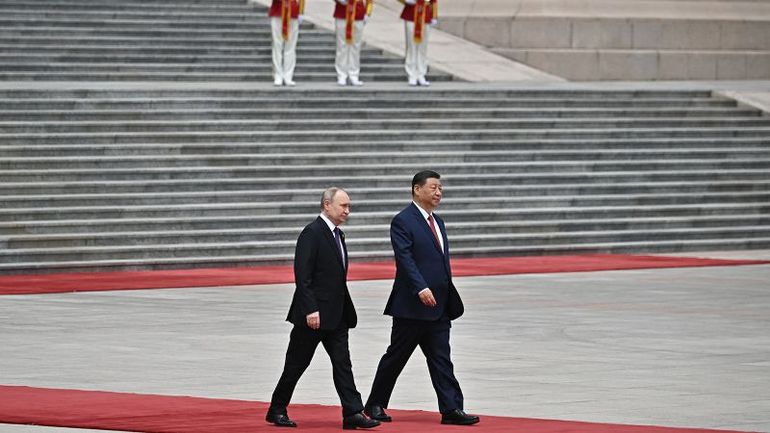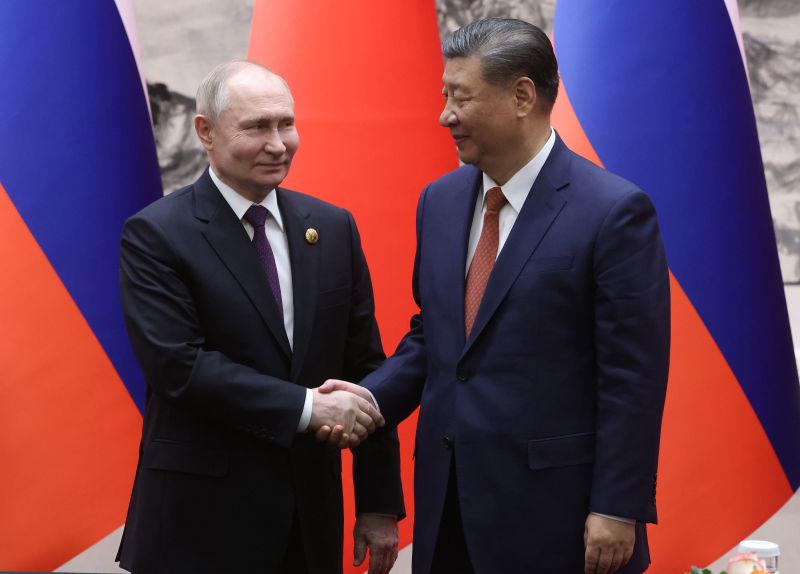
Xi Jinping and Vladimir Putin Showcase Unwavering Alignment in a Global Divide

Following their recent meeting in Beijing, Xi Jinping and Vladimir Putin have solidified their united vision for the world, emphasizing the strength of their autocratic partnership as a formidable driving force in today's divided global landscape.
Xi Jinping and Vladimir Putin's recent meeting in Beijing highlighted the strong alignment between the Chinese and Russian leaders in their global vision and their efforts to strengthen their partnership. They emphasized the importance of their strategic alliance and criticized the United States for its destabilizing actions.
In a comprehensive joint statement that spanned 7,000 words, they expressed their shared perspective on various issues, from Taiwan to the conflict in Gaza. They confidently stated, "Russian-Chinese relations are strong and stable, prevailing amidst the rapid changes in the world, marking the best period in their history."
The scene at the meeting was a stark contrast. While Xi and Putin enjoyed tea in the well-maintained gardens of the official Zhongnanhai compound, engaging in discussions on promoting global peace and development, Ukrainian civilians were pleading for evacuation from villages facing attacks by Russian forces.
Putin recently visited China for a two-day state visit, amidst Western pressure on Chinese President Xi to ensure that Chinese exports are not supporting Russia's war efforts, a claim that China denies.
During Putin's grand welcome in Beijing, which seemed to contradict Western worries about their partnership, it was unclear if any significant progress was publicly announced from their discussions behind closed doors.
Here are three key takeaways from the meeting.
Taking aim at a US-led world order
Xi and Putin met and made strong statements criticizing the global security system supported by the US. They promised to collaborate in order to oppose it. They expressed their intention to enhance cooperation and coordination to combat the US's aggressive approach towards both of their countries, as stated in their joint declaration.
The joint statement urged the US to refrain from providing missile systems to its allies and criticized the US for engaging in what they deemed as highly destabilizing cooperation with its allies.
According to the US, China poses the greatest long-term challenge to the international order, while Russia is seen as a current and obvious threat.
The bold statement comes at a time when Russia and China have expressed disapproval of the US backing of Israel and its conflict with Hamas, and have been working to strengthen relationships in the Global South, where there is growing opposition to Israel's actions in Gaza.
Regarding the conflict, they have advocated for the creation of a separate Palestinian state. They have also highlighted areas where their views align on various controversial global issues such as Taiwan and North Korea.
Growing military cooperation
The two leaders criticized US military alliances but promised to strengthen military trust and cooperation. They agreed to increase joint exercises and combat training, regularly conduct joint sea and air patrols, and enhance their ability to respond together to challenges and threats.
In recent years, both nations have increased their military exercises globally, even after Russia's war in Ukraine in February 2022. This has raised concerns among Western observers that the two US adversaries are aiming to improve their military cooperation.
During his visit to Beijing, Putin was accompanied by key security officials who, according to the Russian president, would participate in informal discussions on Ukraine. Among them were newly appointed Russian Defense Minister Andrey Belousov and his predecessor, Russian Security Council Secretary Sergey Shoigu.
Russian President Vladimir Putin and Chinese leader Xi Jinping attend an official welcoming ceremony in front of the Great Hall of the People in Tiananmen Square in Beijing on May 16, 2024.
Russian President Vladimir Putin and Chinese leader Xi Jinping were seen together at an official welcoming ceremony in front of the Great Hall of the People in Tiananmen Square in Beijing on May 16, 2024.
Sergei Bobylov/Pool/AFP/Getty Images
Related article
China’s President Xi Jinping welcomed his close friend Putin with a grand reception, demonstrating a strong display of unity between the two leaders.
It remains uncertain whether Chinese defense officials were present during the discussions. According to Russian state media, the talks occurred during a four-hour informal meeting within the heavily guarded Zhongnanhai compound, which serves as the residence for the Chinese Communist Party leadership.
Xi reiterated the need for a "political solution" in Ukraine and expressed support for a peace conference acknowledged by both parties, according to the Chinese Foreign Ministry.
Observers believe Putin may have been interested in discussing material support for Russia's defense industry during the meeting. This could include dual-use items that the US claims China is exporting to Russia to support its defense industrial base. Beijing, while maintaining neutrality in the conflict, has defended its trade with Russia as a normal part of their bilateral relations.
But the partnership between China and Russia may face challenges when it comes to China providing military support. Analysts believe that Xi Jinping wants to maintain a strong partnership with Putin without crossing any boundaries set by the West.
According to former US ambassador to NATO Kurt Volker, Putin's request for military assistance from China is unlikely to be fulfilled. China is unlikely to provide weapons, ammunition, or any direct support for Russia's military operations.
While there was a lot of talk, there weren't many specific promises made at the meeting. As Putin left Beijing for the second day of his visit in Harbin, northeastern China, there wasn't much information on any significant deals that were made.
One potential deal that was not finalized was for a second pipeline called "Power of Siberia 2" to transport Russian natural gas to China. There are reports that Beijing is hesitant about moving forward with this agreement, which Russian President Putin hopes will make up for the decrease in revenue from Europe reducing its dependence on Russian energy following the conflict in Ukraine.
BEIJING, CHINA - MAY 16: (RUSSIA OUT) Russian President Vladimir Putin (L) and Chinese President Xi Jinping (R) shake hands during a bilateral meeting on May 16, 2024 in Beijing, China. Russian President Vladimir Putin is in China for a two-day state visit. (Photo by Contributor/Getty Images)
Russian President Vladimir Putin and Chinese President Xi Jinping were seen shaking hands during a bilateral meeting on May 16, 2024 in Beijing, China. Putin was in China for a two-day state visit. The friendly gesture was captured by Getty Images.
Related card
How the Ukraine war brought China and Russia closer together
Instead, the leaders agreed to work together to support the development of major energy projects, such as those involving oil, liquefied natural gas, natural gas, coal, and electricity.
Furthermore, they emphasized the importance of enhancing industrial cooperation in various sectors, including civil aviation construction, electronics, chemical industry, shipbuilding, and industrial equipment.
These promises, although not very specific, do indicate a trend towards increased economic cooperation in the future.
According to Alexandra Prokopenko, a researcher at the Carnegie Russia Eurasia Center, Putin sees Russia's ability to stay economically stable as a significant achievement, largely due to the support from China.
"He's fine with the ongoing dependency between Russia and China, and with the inequality in this relationship," she explained.
Reporting for this article was contributed by CNN's Ivan Watson, Rebecca Wright, Wayne Chang, Anna Chernova, and Alex Stambaugh.
Editor's P/S:
The meeting between Xi Jinping and Vladimir Putin highlighted the growing alignment between China and Russia, particularly in their opposition to the United States. The two leaders expressed their intention to strengthen their partnership and criticized the US for its destabilizing actions.
The meeting also underscored the growing military cooperation between China and Russia, with the two leaders agreeing to increase joint exercises and combat training. This raises concerns among Western observers about the potential for increased military coordination between the two US adversaries. However, it remains unclear whether China will provide military support to Russia in its conflict with Ukraine, as analysts believe Xi Jinping wants to maintain a strong partnership with Putin without crossing any boundaries set by the West.















